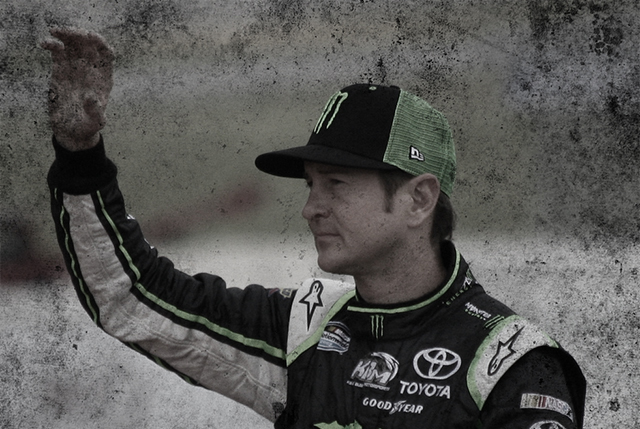
Honest, paywall-free news is rare. Please support our boldly independent journalism with a donation of any size.
Over the weekend, we learned that NASCAR star Kurt Busch was being investigated by police for assaulting his ex-girlfriend Patricia Driscoll. Driscoll has requested both a restraining order and that the court compel Busch to seek counseling after he allegedly “accused her of ‘having spies everywhere and having a camera on the bus to watch him’ ” and then “jumped up, grabbed her face and smashed her head three times against the wall next to the bed.”
Busch’s lawyer, Rusty Hardin—yes, the same Rusty Hardin who repped Roger Clemens in his steroid trial—accused Driscoll of a “complete fabrication by a woman who has refused to accept the end of a relationship.” (The fact that Driscoll is a DC-based executive who runs a nonprofit for vets has not stopped Hardin from rehashing the same sexist clichés of a lying woman scorned, which tells its own story about the limits of “respectability” as a safeguard against sexism.)
Yet one thing did not happen after the news broke of the alleged assault: no one asked Peyton Manning for his thoughts. For that matter, no one asked Clayton Kershaw, Kevin Love or Sidney Crosby if they had any specific insight into how this could have happened. The absence of both that inquiry and any kind of broader uproar speaks volumes about one of the more pernicious aspects of racism in the sports world. This is the way in which the crimes of white athletes are seen as the moral failings of an individual, while the crimes of black athletes are processed by the media as a collective commentary on everyone who both happens to play sports and have black skin.
The video of Ray Rice punching his then-fiancée Janay and knocking her consciousness not only launched a national discussion about domestic abuse and the NFL’s near-pathological serial cover-up of violence against women, but also a parallel discussion about violence against women in “the black community,” as if black athletes—and black men in general—were uniquely predisposed to hurting the women in their lives. Despite the fact that there is not a legitimate domestic violence counselor or study on earth that argued violence against women is a “black problem,” the media were undeterred.
This goes well beyond Ray Rice. Adrian Peterson beats his son bloody with a switch, and Bill Maher—to take just one of many examples—wanted to relate it to black culture, as if child abuse doesn’t happen in white households. Michael Vick fights dogs, and every black athlete gets a mic in their face to ask about the responsibility of black culture—or often the coded “hip-hop culture”—to stand up to cruelty to animals, all the while ignoring the fact that arrests for dog fighting span every shade in the racial rainbow. A white athlete, like Kurt Busch, is under investigation for assault, and no one asks what kind of music he’s listening to or the bagginess, or lack thereof, of his jeans. Hockey players fight, and fans cheer. NBA players fight, and politicians hold press conferences about the absence of “role models.” White athletes are enforcers. Black athletes are “thugs,” a word that Seattle All-Pro cornerback Richard Sherman said so adroitly has become “an accepted way of calling somebody the n-word.” But when Jeff Gordon—another NASCAR hero—tries to assault another driver, “thug” is the furthest word from anyone’s mind.
This is how racism functions throughout the United States. It’s the privilege of being seen as an individual, rather than the collective burden—and collective punishment—of being seen as part of an indistinguishable mass. The great irony of this is that we would be far better off as a society if Peyton Manning were asked about Kurt Busch. Not because he has some sort of magical insight from being white but because, as a high-profile male role model in the world of sports, he should feel a responsibility and, yes, a burden to stand up to violence against women, especially when it reveals itself in the sports world. Similarly, the burden of ending racism—no matter what Piers Morgan may think—begins with white people’s seeing the fight against prejudice as essential to a better world; standing with Michael Brown, not Darren Wilson; standing with Trayvon Martin, not George Zimmerman; and assuming responsibility for the cultural pathologies in the United States that result in violence in both the home and around the world.
A terrifying moment. We appeal for your support.
In the last weeks, we have witnessed an authoritarian assault on communities in Minnesota and across the nation.
The need for truthful, grassroots reporting is urgent at this cataclysmic historical moment. Yet, Trump-aligned billionaires and other allies have taken over many legacy media outlets — the culmination of a decades-long campaign to place control of the narrative into the hands of the political right.
We refuse to let Trump’s blatant propaganda machine go unchecked. Untethered to corporate ownership or advertisers, Truthout remains fearless in our reporting and our determination to use journalism as a tool for justice.
But we need your help just to fund our basic expenses. Over 80 percent of Truthout’s funding comes from small individual donations from our community of readers, and over a third of our total budget is supported by recurring monthly donors.
Truthout has launched a fundraiser to add 379 new monthly donors in the next 6 days. Whether you can make a small monthly donation or a larger one-time gift, Truthout only works with your support.